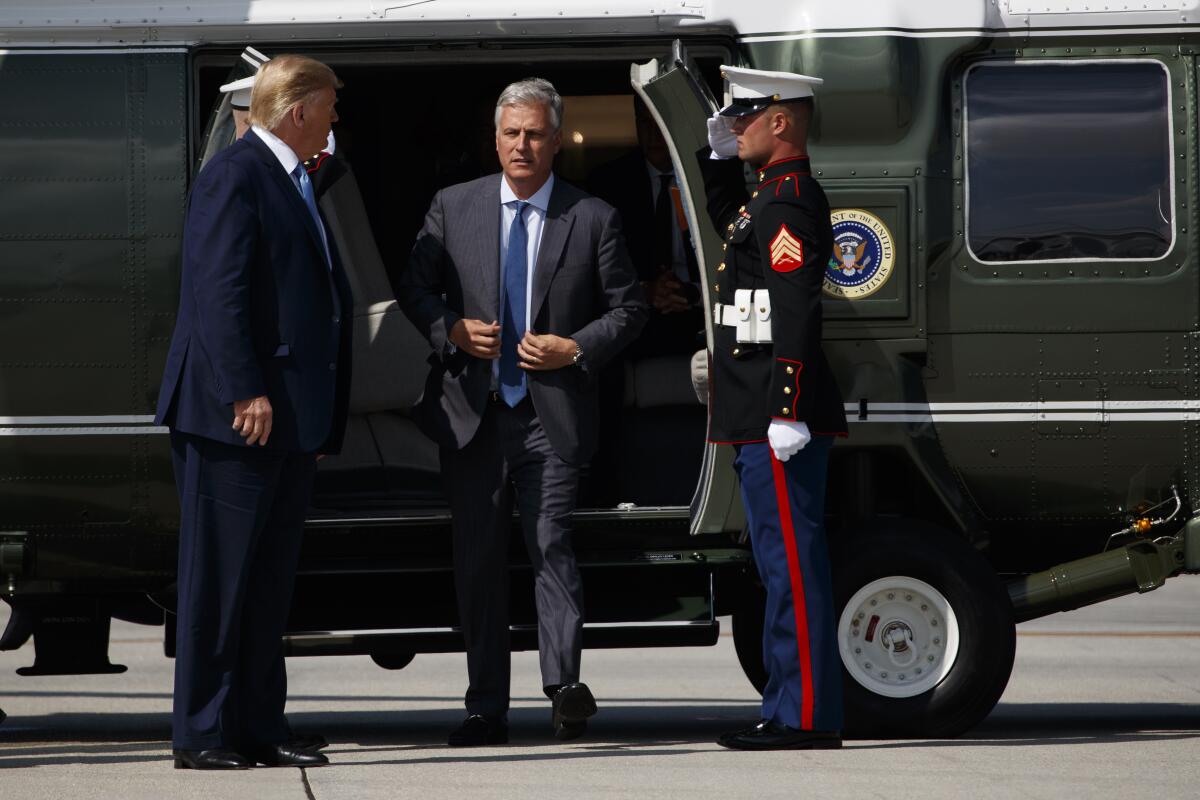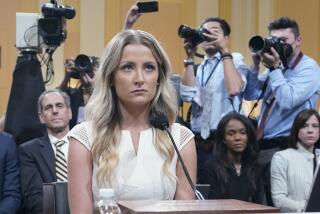Robert O’Brien is an unlikely pick for Trump’s national security advisor

The night of the 2016 presidential election, Robert C. O’Brien, a fixture of Republican presidential campaigns for more than a dozen years, was in London, glued to television screens with American visitors and Brits alike.
“I’m not sure anybody out there predicted a Trump win,” he said several days later. “I certainly didn’t.”
O’Brien, who served as a foreign policy advisor for the failed presidential campaign of Wisconsin Gov. Scott Walker, then for that of Texas Sen. Ted Cruz, never endorsed Donald Trump in 2016. But on Wednesday, the president picked O’Brien, the State Department’s top hostage negotiator, as his fourth national security advisor.
“It’s really a role that, if the president respects the person that’s the advisor, I think it really plays a very, very important role,” Trump said.
Whether O’Brien, a diplomat who has served in both Republican and Democratic administrations, can fit that role is far from clear.
While Trump consistently bashes California, his new national security advisor is very much a product of the state.
Born in Los Angeles, O’Brien attended high school in Santa Rosa and then UCLA. Shortly after completing law school at UC Berkeley and passing the California bar, O’Brien joined the Army Reserve Judge Advocate General Corps and launched his civilian law career, he said in a 2015 interview, one of a series he gave to this reporter between then and 2017.
He moved to La Cañada Flintridge decades ago, and raised two children there. His son Robert died in an accidental drowning in September 2015, a few months after his high school graduation and just as he was poised to embark on a mission for the Church of Jesus Christ of Latter-day Saints.
O’Brien left the Army Reserve as a major in 2005, but his service led to work with the United Nations Security Council from 1996 to 1998, where he helped review billions of dollars in claims from Iraq’s 1990 invasion of Kuwait, which prompted the U.S.-led Persian Gulf War in 1991.
Later, he served four years on a State Department committee trying to reform the judicial system in Afghanistan, starting under President George W. Bush and finishing under President Obama.
He has long backed the mainstream Republicans that Trump disdains. After advising now-Sen. Mitt Romney (R-Utah), a fellow Mormon, in his failed 2008 and 2012 presidential runs, O’Brien worked for Walker, one of the first candidates to drop out in 2016, and then Cruz, ultimately Trump’s runner-up for the Republican nomination.
He’s also the author of “While America Slept: Restoring American Leadership to a World in Crisis.” The 2016 book, according to a review that appeared in Foreign Policy, warns against a hollowed-out military and, in particular, having a “numerically short navy,” and discusses the threats posed by China and Islamic extremism.
O’Brien is the co-founding partner of Larson O’Brien LLP in Los Angeles, a litigation firm. In addition to his client work, O’Brien served as an arbitrator in international proceedings and was appointed by federal courts to serve as a special master in numerous complex cases.
O’Brien sees himself as a Reagan Republican, and he supported Trump’s campaign promises to “rebuild the military.” Still, when Trump emerged as the likely Republican nominee, O’Brien expressed reservations about his national security prowess.
“Unfortunately, he has been short on specifics and has criticized key weapons systems,” he said at the time.
Yet O’Brien didn’t join the “Never Trump” movement founded by some Republican former national security officials and analysts, keeping his options open.
“It played into [Trump’s] message that he’s an outside-the-establishment candidate, and that outsider message resonated with GOP voters,” O’Brien said then.
After the election, O’Brien suggested that Trump’s tough language against adversaries like Iran, as well as allies from NATO members to Japan, was yielding results.
“My perception of Mr. Trump is that he’s a negotiator,” O’Brien said then. “It’s the first time in my lifetime that I can recall having very serious conversations [with Europeans] about increasing defense spending, about Russians being on the doorstep. … Trump’s isn’t just rhetoric. They know they better take some steps.”
O’Brien also expressed support for Trump’s pledges to end the 2015 Iran nuclear agreement, calling it “the worst deal that’s ever been negotiated,” much as Trump did before he pulled out last year.
O’Brien also has criticized isolationist policies, potentially putting him at odds with Trump’s promises to withdraw U.S. troops from abroad and force American allies to pay more for U.S. military support. That tension was central to Trump’s ouster of John Bolton, Trump’s former national security advisor, last week.
“I think Robert is low-drama, but I would not interpret that as being weak,” said Pierre-Richard Prosper, who was ambassador-at-large for war crimes in the George W. Bush administration and who’s known O’Brien for more than 25 years. “He’s a strong person and confident in his views. ... On foreign policy and the role of the U.S. in the world, those remain consistent.”
“He understands the world for the dangerous place it is,” said Sen. Lindsey Graham (R-S.C.), who also knows O’Brien.
Days after Trump won, O’Brien predicted that he would “grow into” the presidency.
“There’s a lot of rhetoric that takes place in the campaign, but the president is constrained by the Constitution and the court,” O’Brien said. “For the most part, American presidents grow into the job. I have no doubt Donald Trump will grow into the office.”
Times staff writer Eli Stokols contributed to this report.
More to Read
Get the L.A. Times Politics newsletter
Deeply reported insights into legislation, politics and policy from Sacramento, Washington and beyond. In your inbox three times per week.
You may occasionally receive promotional content from the Los Angeles Times.







